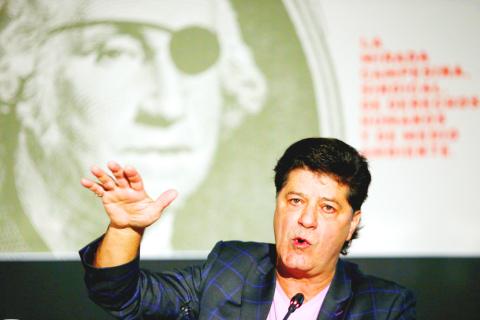The head of Canada’s biggest private-sector union, Unifor, on Friday headed to Mexican Senate, promising to fight at the North American Free Trade Agreement (NAFTA) trade pact talks for improved Mexican wages and free collective bargaining as a way of benefiting workers across North America.
The issue of tougher labor standards has emerged as a key sticking point in the talks to update NAFTA and has brought disparate groups of workers from across the region closer to US right-wing populists.
“There will not be an agreement until the Mexican team agrees to free collective bargaining, the elimination of yellow unions and that Mexican workers get paid what they deserve,” Unifor president Jerry Dias said.

Photo: Reuters
The event held in a side chamber of the Senate was organized by umbrella organization Mexico, “Better Without Free Trade Agreements,” which represents dozens of social organizations and unions.
Dias said that low wages have not only hurt Mexican workers, but have also prompted manufacturing jobs in Canada and the US to leave for Mexico.
By including much tougher labor standards in an updated NAFTA the issue could be dealt with head on, he said. “When you start talking about low wages, we can deal with that under the dispute mechanism as an unfair subsidy.”
Participants of the event planned to march later in the day to the upscale Camino Real hotel, where the fifth round of talks for NAFTA are being held.
Negotiators met in Mexico City for the fifth of seven planned rounds that are due to wrap up by the end of March next year to avoid affecting Mexico’s presidential election.
“We’re just getting started. There’s a long ways to go. It’s a challenging negotiation,” chief Canadian negotiator Steve Verheul told reporters.
Canadian and Mexican officials initially said they would simply not discuss contentious US proposals such as a five-year sunset clause and boosting the North American content of cars to 85 percent from 62.5 percent.
The focus in Mexico City would be on making arguments to the US side as to why their proposals as written would not work, a Canadian government source said.
Canada, the source added, was happy to discuss so-called rules of origin governing car content, but said the 85 percent figure was impossible.
Canadian sources on Thursday said they were open to a Mexican proposal to review NAFTA every five years rather than the US plan to bring in a sunset clause that would automatically terminate the deal if it was not renegotiated.
A Mexican official said the US needed to make clear what it hoped to achieve with tougher rules of origin, given the difficulty of raising the threshold.
Noting that 85 percent North American content was not feasible, the official said Mexico did not want “a rupture” to occur in the talks.
Washington also wants NAFTA to set a 50 percent minimum US content requirement for cars, which Canada and Mexico say cannot work.
“Once [the Americans] have explained all that, we can see about finding common ground,” the Mexican official said.
Meanwhile, the US on Friday revised its negotiating objectives for revamping the trade pact, purposing to eliminate Canada’s import tariffs on dairy, poultry and egg products, and to allow more protections for seasonal US produce that is sensitive to imports from Mexico.
The US Trade Representative’s office said it is keeping in place most of its NAFTA objectives, first published in July, including a first-ever goal of reducing US trade deficits.
“If we are able to achieve these objectives, we will both modernize and rebalance NAFTA to better serve the interests of our workers, farmers, ranchers and businesses,” US Trade Representative Robert Lighthizer said in a statement.
The new objectives on investment and intellectual property rights add considerable detail, partly aimed at reflecting existing demands and partly aimed at setting precedents for future trade agreements.

South Korea’s equity benchmark yesterday crossed a new milestone just a month after surpassing the once-unthinkable 5,000 mark as surging global memory demand powers the country’s biggest chipmakers. The KOSPI advanced as much as 2.6 percent to a record 6,123, with Samsung Electronics Co and SK Hynix Inc each gaining more than 2 percent. With the benchmark now up 45 percent this year, South Korea’s stock market capitalization has also moved past France’s, following last month’s overtaking of Germany’s. Long overlooked by foreign funds, despite being undervalued, South Korean stocks have now emerged as clear winners in the global market. The so-called “artificial intelligence

CONFUSION: Taiwan, Japan and other big exporters are cautiously monitoring the situation, while analysts said more Trump responses ate likely after his loss in court US trading partners in Asia started weighing fresh uncertainties yesterday after President Donald Trump vowed to impose a new tariff on imports, hours after the Supreme Court struck down many of the sweeping levies he used to launch a global trade war. The court’s ruling invalidated a number of tariffs that the Trump administration had imposed on Asian export powerhouses from China and South Korea to Japan and Taiwan, the world’s largest chip maker and a key player in tech supply chains. Within hours, Trump said he would impose a new 10 percent duty on US imports from all countries starting on

Chinese artificial intelligence (AI) start-up DeepSeek’s (深度求索) latest AI model, set to be released as soon as next week, was trained on Nvidia Corp’s most advanced AI chip, the Blackwell, a senior official of US President Donald Trump’s administration said on Monday, in what could represent a violation of US export controls. The US believes DeepSeek will remove the technical indicators that might reveal its use of American AI chips, the official said, adding that the Blackwells are likely clustered at its data center in Inner Mongolia, an autonomous region of China. The person declined to say how the US government received

Like many of us who are mindful of our plastic consumption, Beth Gardiner would take her own bags to the supermarket and be annoyed whenever she forgot to do so. Out without her refillable bottle, she would avoid buying bottled water. “Here I am, in my own little life, worrying about that and trying to use less plastic,” she says. Then she read an article in this newspaper, just over eight years ago, and discovered that fossil fuel companies had plowed more than US$180 billion into plastic plants in the US since 2010. “It was a kick in the teeth,” Gardiner